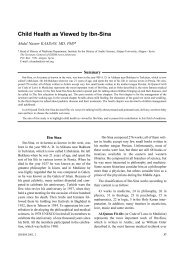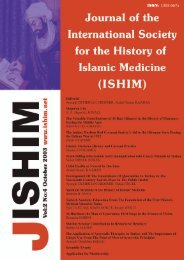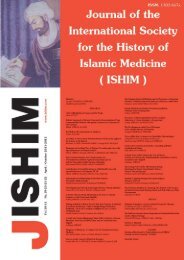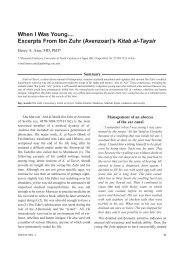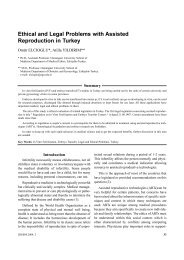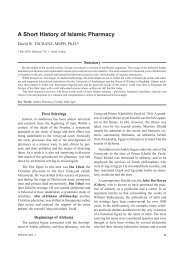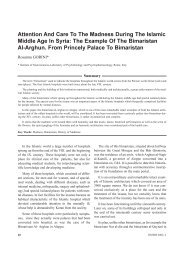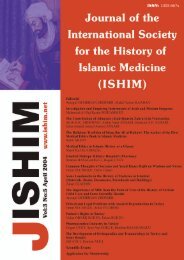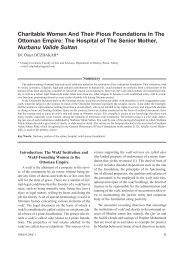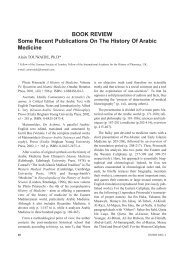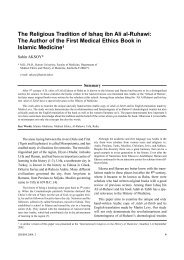04 II.qxd - International Society for the History of Islamic Medicine
04 II.qxd - International Society for the History of Islamic Medicine
04 II.qxd - International Society for the History of Islamic Medicine
- No tags were found...
Create successful ePaper yourself
Turn your PDF publications into a flip-book with our unique Google optimized e-Paper software.
Licensed to:4 Chapter One/The Essence <strong>of</strong> AnthropologyFor as long as <strong>the</strong>y have been on earth, people havesought answers to questions about who <strong>the</strong>y are,where <strong>the</strong>y come from, and why <strong>the</strong>y act as <strong>the</strong>y do.Throughout most <strong>of</strong> human history, though, people reliedon myth and folklore <strong>for</strong> answers, ra<strong>the</strong>r than on<strong>the</strong> systematic testing <strong>of</strong> data obtained through carefulobservation. Anthropology, over <strong>the</strong> last 150 years, hasemerged as a tradition <strong>of</strong> scientific inquiry with its ownapproaches to answering <strong>the</strong>se questions. Simply stated,anthropology is <strong>the</strong> study <strong>of</strong> humankind in all times andplaces. While focusing primarily on Homo sapiens—<strong>the</strong>human species—anthropologists also study our ancestorsand close animal relatives <strong>for</strong> clues about what itmeans to be human.This is not to say that people have been unaware <strong>of</strong><strong>the</strong> existence <strong>of</strong> o<strong>the</strong>rs in <strong>the</strong> world who look and actdifferently from <strong>the</strong>mselves. The Bible’s Old and NewTestaments, <strong>for</strong> example, are full <strong>of</strong> references to diverseancient peoples, among <strong>the</strong>m Babylonians, Egyptians,Greeks, Jews, and Syrians. However, <strong>the</strong> differencesamong <strong>the</strong>se people pale by comparison to those amongany <strong>of</strong> <strong>the</strong> more recent European nations and (<strong>for</strong> example)traditional indigenous peoples <strong>of</strong> <strong>the</strong> Pacific islands,<strong>the</strong> Amazon rain<strong>for</strong>est, or Siberia.THE DEVELOPMENTOF ANTHROPOLOGYAlthough works <strong>of</strong> anthropological significance havea considerable antiquity—two examples being crossculturalaccounts <strong>of</strong> people written by <strong>the</strong> Greek historianHerodotus about 2,500 years ago and <strong>the</strong> NorthTHOMSON AUDIOSTUDY PRODUCTSTake advantage <strong>of</strong><strong>the</strong> MP3-ready Audio LectureOverviews and comprehensiveaudio glossary <strong>of</strong> key terms<strong>for</strong> each chapter. See <strong>the</strong>preface <strong>for</strong> in<strong>for</strong>mation onhow to access this on-<strong>the</strong>-gostudy and review tool.African Arab scholar IbnKhaldun nearly 700 yearsago—anthropology as adistinct field <strong>of</strong> inquiry isa relatively recent product<strong>of</strong> Western civilization. In<strong>the</strong> United States, <strong>for</strong> example,<strong>the</strong> first course in generalanthropology to carrycredit in a college or university(at <strong>the</strong> University<strong>of</strong> Rochester in New York)was not <strong>of</strong>fered until 1879. If people have always beenconcerned about <strong>the</strong>mselves and <strong>the</strong>ir origins, and those<strong>of</strong> o<strong>the</strong>r people, <strong>the</strong>n why did it take such a long time <strong>for</strong>a systematic discipline <strong>of</strong> anthropology to appear?The answer to this is as complex as human history.In part, it relates to <strong>the</strong> limits <strong>of</strong> human technology.Throughout most <strong>of</strong> history, people have been restrictedin <strong>the</strong>ir geographic horizons. Without <strong>the</strong> means <strong>of</strong> travelingto distant parts <strong>of</strong> <strong>the</strong> world, observation <strong>of</strong> culturesand peoples far from one’s own was a difficult—ifnot impossible—undertaking. Extensive travel was usually<strong>the</strong> exclusive privilege <strong>of</strong> a few; <strong>the</strong> study <strong>of</strong> <strong>for</strong>eignpeoples and cultures was not likely to flourish until improvedmodes <strong>of</strong> transportation and communicationcould be developed.anthropology The study <strong>of</strong> humankind in all times and places.© Documentary Educational ResourcesAnthropologists come from many corners <strong>of</strong> <strong>the</strong> world and carry outresearch in a huge variety <strong>of</strong> cultures all around <strong>the</strong> globe. Dr. JayasinhjiJhala, pictured here, hails from <strong>the</strong> old city <strong>of</strong> Dhrangadhra inGujarat, northwest India. A member <strong>of</strong> <strong>the</strong> Jhala clan <strong>of</strong> Rajputs, anaristocratic caste <strong>of</strong> warriors, he grew up in <strong>the</strong> royal palace <strong>of</strong> hisfa<strong>the</strong>r, <strong>the</strong> maharaja. After earning a bachelor <strong>of</strong> arts degree in India,he came to <strong>the</strong> United States and earned a master’s in visual studiesfrom MIT, followed by a doctorate in anthropology from Harvard. Currentlya pr<strong>of</strong>essor and director <strong>of</strong> <strong>the</strong> programs <strong>of</strong> Visual Anthropologyand <strong>the</strong> Visual Anthropology Media Laboratory at Temple University, hereturns regularly to India with students to film cultural traditions in hisown caste-stratified society.Copyright 2008 Thomson Learning, Inc. All Rights Reserved. May not be copied, scanned, or duplicated, in whole or in part.



